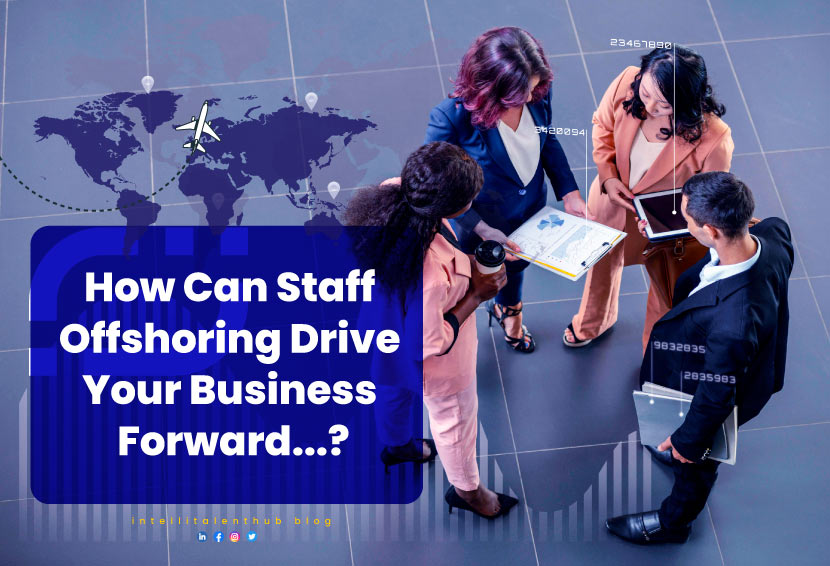Running a business can feel like a never-ending task. You’re constantly striving to keep costs down, find the best talent, and stay ahead of the competition. But what if there was a secret weapon hiding in easy access, waiting to push your business forward? Enter the exciting world of staff offshoring.
But what exactly does offshoring mean, and how can it help your business grow? This article delves into the details of the staff offshoring definition, exploring its workings and the numerous benefits it offers to companies across various sectors.
Staff offshoring definition
To understand the staff offshoring definition, we must first understand what offshoring is?. Offshoring refers to the practice of relocating certain business processes or functions to another country. Usually, this is done to benefit from cost advantages, access specialized skills, or improve overall efficiency. Staff offshoring, more specifically, involves hiring employees in foreign countries to perform roles that were previously managed locally. These roles can range from customer service and technical support to Offshoring accounting and Offshoring banking functions.
Why do companies engage in offshoring?
After understanding the “staff offshoring definition,” there are several strong reasons why companies choose to offshore staff:
1) Cost Savings
The primary motivation for many companies is the potential for significant cost savings. Lower labor costs, especially in developing countries, can translate into substantial savings on salaries, benefits, and overhead expenses.
2) Access to Global Talent
Offshoring allows companies to reach into a global pool of talent. This is particularly beneficial for roles requiring specialized skills that may be uncommon or expensive in the home country.
3) Enhanced Focus on Core Business
By offshoring specific tasks, businesses can concentrate their resources and efforts on their primary objectives and strategic initiatives. This can lead to improved overall efficiency and productivity.
4) 24/7 Operations
Depending on the time zone difference, offshoring operations can enable companies to offer 24/7 customer support or extended business hours, enhancing customer satisfaction and global competitiveness.
5) Risk Prevention
Expanding operations across different locations can help minimize risks related to local market volatility, economic downturns, and geopolitical issues.
Offshoring in Different Industries
Offshoring accounting and offshoring banking are prominent examples of how this practice has been adopted across various sectors.
- Offshoring Accounting: Many businesses offshore their accounting functions to countries like India, where there is a large pool of skilled accountants. This not only reduces costs but also ensures compliance with international standards and practices.
- Offshoring Banking: The banking industry leverages offshoring to manage back-office operations, customer support, and even complex financial analysis. This enables banks to operate efficiently 24/7, providing better service to their global customer base.
Offshoring to Egypt
Egypt has emerged as a prominent destination for offshoring industry due to several key factors:
- Strategic Location: Egypt’s geographic location provides a time zone that aligns well with both European and North American markets, enabling smooth business operations.
- Cost-Effective Labor Market: 20-30% more cost competitive compared to regional offshoring competition in Eastern Europe.
- Skilled Workforce: Egypt has a large pool of young, skilled professionals proficient in multiple languages, including English, French, and German, making it an attractive option for multinational companies.
- Government Initiatives: The Egyptian government has implemented various initiatives to foster the growth of the offshoring industry, such as the establishment of technology parks and the enhancement of digital infrastructure.
- Robust Infrastructure: Egypt boasts a robust infrastructure that supports business operations and facilitates efficient service delivery.
These factors combined make offshoring to Egypt a strategic choice for businesses looking to optimize costs while maintaining high service quality and operational efficiency.
Offshoring Companies and the UAE
The offshoring industry has seen exponential growth, with numerous companies specializing in providing offshore staffing solutions. These companies offer end-to-end services, from recruitment and training to ongoing management and support.
Offshore companies UAE as IntelliTalenthub, have become increasingly popular due to the country’s strategic location, business-friendly environment, and robust infrastructure. The UAE offers a unique blend of Western business practices and access to the markets of the Middle East, making it an attractive offshoring destination.
Challenges and Considerations
While the benefits of offshoring industry are substantial, it is essential to address potential challenges:
- Cultural Differences: Navigating cultural differences requires sensitivity and adaptability to ensure effective communication and collaboration.
- Quality Control: Maintaining consistent quality across offshore teams requires strict instruction, clear guidelines, and regular supervision.
- Data Security: Ensuring the security of sensitive information when offshoring is essential. Companies must implement robust data protection measures and comply with relevant regulations.
Best Practices for Successful Staff Offshoring
By implementing these best practices, businesses can maximize the benefits of staff offshoring and minimize potential challenges:
- Clearly Define Objectives: Clearly outline your offshoring goals and the specific functions you plan to relocate.
- Thorough Planning & Research: Conduct in-depth research on potential offshoring locations and their legal, cultural, and business environments.
- Invest in Communication & Training: Prioritize clear communication strategies, cultural sensitivity training, and ongoing team development.
- Choose the right partner: Partner with experienced offshoring companies in the UAE or your chosen location to navigate legalities, acquire talent, and ensure compliance.
- Performance Management & Monitoring: Establish clear performance metrics and communication channels to ensure offshore staff are well-integrated and meeting expectations.
Conclusion
In conclusion, by understanding the complexities of offshoring and implementing best practices, companies can drive their businesses forward, achieving sustained growth and competitiveness in the global market.
Don’t wait any longer to take your business to the next level! Partner with IntelliTalentHub, your staff offshoring experts, and watch your company transform into an efficiency and productivity powerhouse. Contact IntelliTalentHub today and let us be your offshoring superhero.
FAQS
What is offshoring vs outsourcing?
If you ask about “offshoring meaning,” It involves moving entire business operations to another country, typically for lower costs. Outsourcing, on the other hand, involves contracting specific tasks to a third-party company, which can be domestic or international.
What is offshore staff?
Offshore staff are employees working for a company in a different country, often hired for their skills and lower labor costs compared to the company’s home location.




